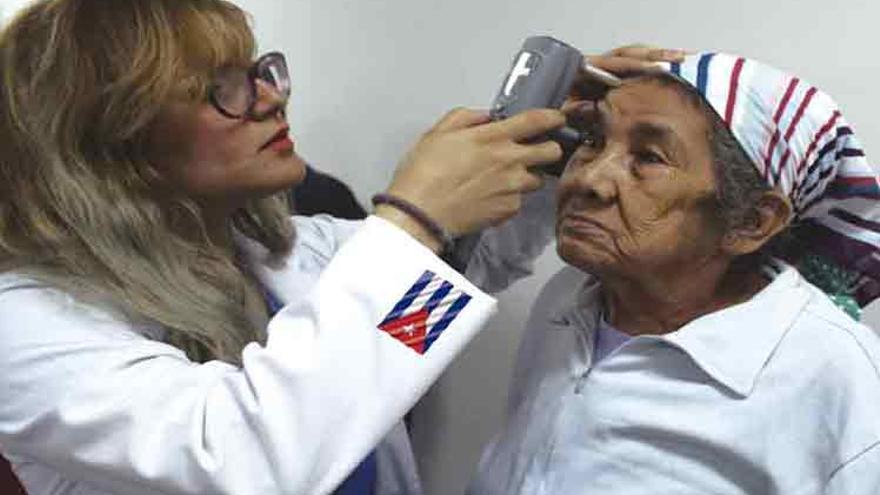
![]() 14ymedio, Havana, 8 December 2019 — The Cuban medical mission in Uruguay is at the center of an intense controversy over its professional abilities. Six of nine ophthalmologists on the Island who participated in the Miracle Mission failed to revalidate their titles in the South American country, according to an extensive report published this Sunday by the local newspaper El País.
14ymedio, Havana, 8 December 2019 — The Cuban medical mission in Uruguay is at the center of an intense controversy over its professional abilities. Six of nine ophthalmologists on the Island who participated in the Miracle Mission failed to revalidate their titles in the South American country, according to an extensive report published this Sunday by the local newspaper El País.
The Uruguayan ophthalmology chair reproached a group of Cuban doctors who had previously performed operations at the Hospital de Ojos (Eye Hospital). “Despite the fact that the Uruguayan teachers concluded that they [the Cuban doctors] did not know enough, they had practiced for two years,” the article details.
Cuban doctors arrived in that country starting in 2007 with Operation Miracle, through which 90,000 Uruguayans were operated on for cataracts and other ophthalmological conditions. Before the arrival of that mission, patients had to pay between 1,500 and 2,000 dollars to undergo one of those procedures, but the agreement between Havana and Montevideo contributed to “democratize these surgeries,” the text details.
The Miracle Mission began in 2004, led by Cuba and Venezuela, at a time of close relationship between Hugo Chavez and Fidel Castro. The doctors working on this initiative have been deployed in 31 countries in Latin America, Africa and Asia.
For years, Uruguay has been a posting very desired by Cuban doctors to serve on official mission, due to its social stability. The selection of professionals traveling to that country has been made within the Island and the brigades rotate every two years.
To practice in that country, Cuban professionals only have to revalidate their title as a general practitioner, a procedure that they perform in the Faculty of Medicine. “They just have to present the certificate and at no time do they take a test to confirm that they have the necessary knowledge.”
“It is an agreement in which so many doctors, so many nurses and so many opticians come. We did not know the training of the brigade, we never knew it. The only thing we knew was that surgeons came to operate on cataracts, but we did not know who was part of the team. We thought they knew what to do,” says an ex-director of the Eye Hospital who gave statements to El País.
In these 12 years, 60 Cuban doctors passed through the Eye Hospital, according to data published on the digital site of this health center. “The majority served for two years, but there were nine who defected from the Castro regime and wanted to stay,” the note adds. In their new situation “they had to revalidate their ophthalmologist degrees. Their general medicine license had already been validated upon arrival, but they had to prove that they had done the postgraduate course. Therefore, all these professionals went to the Graduate School of the Faculty of Medicine, which is responsible for authorizing the titles issued outside.”
However, six of the nine Cuban doctors did not pass the test, according to the records of the Graduate School accessed by El País. “All of them, although the ophthalmology chair considered that they do not know enough, had previously worked for two years at the Eye Hospital.”
In addition to those six doctors who could not validate their studies, three other Cuban professionals appeared in the last two years before the Graduate School. The ophthalmology chair has not yet ruled in these cases, so it is not possible to know if they passed the final test or not.
Every two years, and also before changes of the Government, a representative of the Cuban regime arrives at the Eye Hospital. That person is in charge of talking with the health center management and is the one who designates the doctors who will travel months later to Uruguay. “We only send them the best,” the representative is said to promise.
In the health center they explain that the training of Cuban doctors is different from that of Uruguayans. There are differences in the programs and the reason why they would have failed the tests given to them by the Chair of the Clinical Hospital. They say they learn “more specific knowledge and not as general” as local specialists.
That is why they usually call them, in a derogatory way, “catarologists.” The majority would have studied the procedure which they would later perform in their work, ignoring the rest of the knowledge related to ophthalmology.
The poor results on the tests have put the Uruguayan Association of Ophthalmology on alert. Andrea Merrone, its president, emphasizes that they do not oppose the arrival of foreign doctors to the country, although they would like to know if the professionals “have sufficient suitability” to practice.
Although criticisms about the level of the doctors of the Island had accumulated in Uruguay, the trigger for publication in the press has been the recent complaint made by the provisional Government of Jeanine Áñez in Bolivia. In that country, just 205 of the 702 Cuban doctors who were deployed had a degree. The remainder were technicians or drivers, doctors making up just a small number of the total.
_____________
COLLABORATE WITH OUR WORK: The 14ymedio team is committed to practicing serious journalism that reflects Cuba’s reality in all its depth. Thank you for joining us on this long journey. We invite you to continue supporting us by becoming a member of 14ymedio now. Together we can continue transforming journalism in Cuba.
